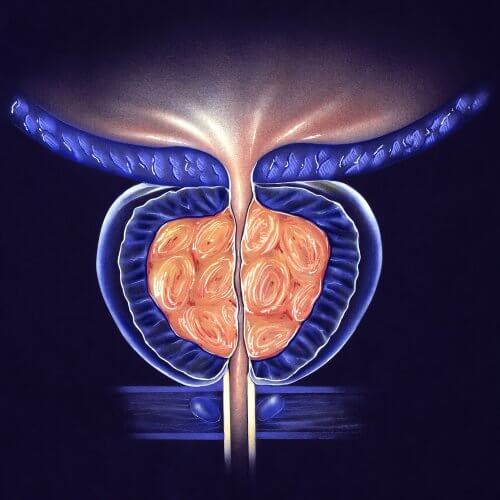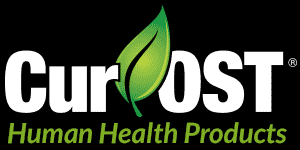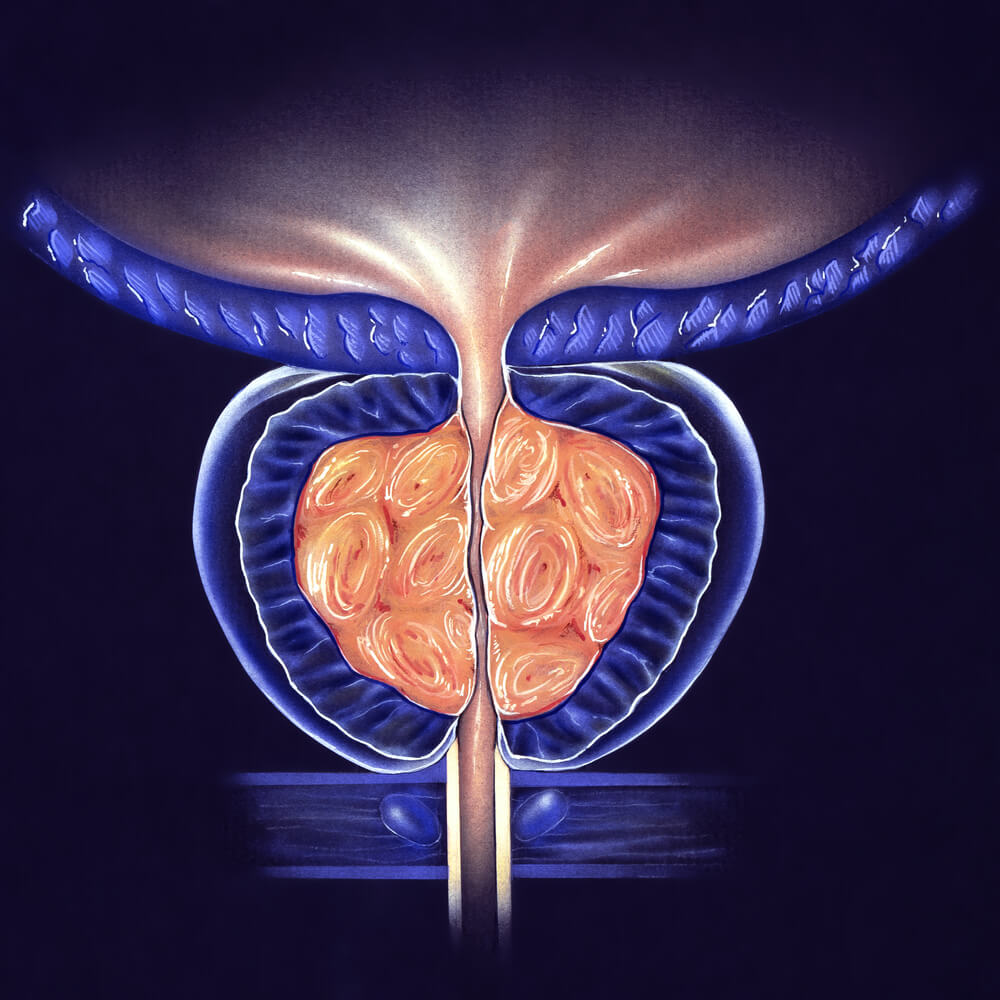Every gender has its weakness and area of susceptibility when it comes to health given the differences in the anatomy of the urogenital and reproductive tracts. The urogenital system is highly susceptible to damage over time in both men and women, creating mild to more severe problems which can be life threatening and not just a nuisance. For men, prostate health is a major concern, especially as they age. The clinical problems created can range from mild prostate enlargement or benign prostatic hyperplasia to more serious conditions such as prostate cancer. Given the severity of side effects created by many current therapies, we have to ask if there are ways to keep the prostate gland healthy in men such as herbs?

Aging in men often is correlated with many health complaints, but prostate health is one that tops the list. As we age, there may be more signs of urinary related problems such as increased urinating frequency, difficulty in urinating, or even pelvic pain for some. These problems are often seen as par for the course, much like a women going through menopause I suppose, but when it comes to prostate health the problems can be more severe, gaining traction over time and worsening.
The prostate gland is only found in men, being located at the neck of bladder. The prostate is an accessory sex gland, producing various fluids found in semen. The urethra, which exits the bladder and transports urine out of the body, is surrounded by the prostate at this location, traveling it through it. In normal circumstances, the prostate is soft, pliable and not enlarged. Thus, the outflow of urine is not compromised or ‘squeezed off’. As the prostate enlarges, due to various reasons, it becomes firmer and pinches off the urethra, reducing its diameter and thus impacting urine flow. Thus, urine outflow is reduced and urine begins to buildup in the bladder. There is incomplete bladder emptying, so men often find they need to urinate more frequently, while the urine volume produced is reduced.
Symptoms of prostate problems in men include:
- Frequent urge to urinate
- Need to urinate many times during the night
- Pain upon urination or pelvic pain
- Blood in urine or semen
- Pain upon ejaculation
- Frequent pain in back, pelvis, hips or upper thighs
- Dribbling of urine
- Defecation difficulty or ‘ribbon’ consistency stools
Alternative Perspectives on Prostate Health in Men
Health from my perspective is best protected from a preventative point of view rather than a reactive one. As the saying goes, “an ounce of prevention is worth a pound of cure‘. Given the fact that I am aging myself, these health problems are more on my personal radar and I try my best to take every preventative action. However, to do that, one must try to grasp why these things are occurring. I can ramble on an on with a traditional western medicine point of view, which really does not specify cause, but more so effect, or I can look at alternative medicine concepts which make more sense.
The aging process is the cause for most of our maladies when it comes to health, whether if we are a man or a woman. As we age, the process of inflammation catches up with us, which really started the moment we were born into this world. Low grade inflammation is happening in all of us, regardless of age or gender, and is creating cellular damage. The fact is that the longer we live, the more likely we are to see the end result of this inflammatory damage. Thus, many conditions from mental problems to cancer are found in the older population. We don’t just contract these condition because we are 50 or maybe 65, but more so the damage was more severe in our bodies over time and we just see the evidence of that damage at those ages. This is why, if I had something to tell the younger population, it is so important to watch what you put into your body and how you take care of it from exercise to proper mindset at a younger age. Taking care of that body at a younger age can mount to many disease free years later in life. This includes prostate health in men. We don’t just turn 50 and find we are peeing many times during the night.
Prostate health or compromise is a fact of aging, but there are things you can do now at a younger age and also at an older age to keep that organ healthy. We are willing participants, one way or the other.
In looking at alternative medicine philosophies, any organ that increases in size does so due to the accumulation of ‘something’. This is not far off from western medicine as well, as if we see an enlarged prostate, there has to be ‘something’ adding to that original size, making it bigger. In many cases, this is a tumor or cancer for instance. If we look at a prostate gland which is enlarged but not showing evidence of cancer, more than likely we would find that there is more ‘fluid’ found within that organ which is accumulating. This would be akin to a dry sponge which is now soaked with water. The prostate gland is edematous in medical terms or swollen. This swelling or fluid accumulation is then increasing the relative size to the organ and likewise pinching off the urethra.
These changes, including fluid accumulation, are all a result of inflammatory related cellular events which are going on within that organ. This is the end result of accumulating chronic inflammation within the body, which for some men, tends to settle or impact the prostate gland. In many cases, similar events are going on elsewhere in the male body, such as concurrent cardiovascular disease, erectile dysfunction, diabetes, vascular problems, swollen legs, and metabolic related events. Many men with prostate problems are also overweight or obese, which in truth is like fluid accumulation throughout the body in the form of fat.
So, we are right back to inflammation in the body, being manifested as cellular dysfunction and fluid accumulation.
In the world of alternative medicine, this ‘fluid accumulation’ is viewed as ‘dampness‘ in Chinese Medicine and ‘ama‘ in Ayurvedic medicine. Both are viewed as fluid and toxin buildup in the body, all being related to inflammatory events. Additionally, this fluid or toxin buildup contributes to more inflammatory problems, so the cycle becomes a viscous one as well. Thus, as has been known for a long time now, overweight individuals are more prone to various health ailments. Prostate health in men is no exception and every man is susceptible!
To go one step further, this ‘dampness or ama’ accumulation in the body is closely linked with digestive health, or in many perspectives is directly linked with digestive health. The interesting thing here to me, after years of contemplation on the subject, is that digestive health is related not just to the diet we choose to consume but also to other factors including exercise, lifestyle, and even our mindset or emotions. Think about that last one for a while and you will likely see the connection between your emotions and your digestion. Some emotions favor it, while others not so much. Alter that digestion one way or the other, and your body is prone to this buildup of toxic debris in the form of “dampness’ or ‘Ama’, which equates to a higher level of inflammation. The digestive microbiome in your body is extremely important, yet very susceptible to upset and imbalance.
Prostate Health; Herbs and Diet
If we could just go back in time and tell our younger selves one thing, it would likely be to eat better and potentially utilize herbs as a part of that diet. At least that is what I would tell myself. Looking back upon my life, I was diagnosed with bladder cancer at the age of 36, which is very atypical. This was a reflection of poor lifestyle and dietary choices, coupled with huge amounts of stress as a doctor seeing patients. This was a reflection of toxin buildup in my own body and why now, at the current age of 52, making proper choices is very high on my list. I am just passing along words of wisdom, so to speak, helping another through what I have learned.
When it comes to prostate health, our area of focus should be upon digestion and the urinary tract when it comes to diet and herbal usage. There are many ways to do this, but here are my main ‘go-to-herbs’ which I try to utilize daily in my regimen to support both. When it comes to this ‘dampness’ or ‘Ama’ accumulation, what we are desiring are herbs which literally drain fluid from the body. This can be in the form of diuretic type of actions or it can be in the form of eliminating excess toxins via the bowels as well as other routes. Interestingly enough, these herbs all have potent abilities to modify the inflammatory pathways in the body, so they are additionally helpful in other areas of our health from joints to eyesight.
Diet and Herbs to Benefit Prostate Health:
- Watch your body weight and body mass index. Maintain and active lifestyle which helps to burn excess calories, reduce weight, and positively impact inflammation in your body.
- Eliminate processed foods from your diet and watch the additives and sodium levels in perceived ‘healthy foods such as soups or other meals found in restaurants.
- Consume high volumes of green leafy vegetables such as green spinach, broccoli, asparagus, while consuming other vegetables daily such as carrots, sweet potato, garlic and onion.
- Many fruits, such as oranges, blueberries, raspberries, and strawberries are very beneficial.
- Triphala herbal blend is one of my favorites and something I personally take daily in the evening. This is an herbal blend of three herbs traditionally used in Ayurvedic medicine to support healthy digestion, aid in eliminating toxic buildup from the body, benefitting inflammation on all levels, and promoting healthy bowel movement frequency. These three herbs are full of antioxidant and anti-inflammatory compounds, including tannins, which promote digestive and inflammatory health throughout the body. It is traditionally consumed in smaller volumes once to twice daily, usually after meals. Triphala is well known with published data on digestive health and inflammation, but also has been shown to impact prostate cancer cells. (Russell, 2011)
- Curcumin is another herb which should go without saying in my book. This incredible herb, Curcuma longa, has a long list of research supported health benefits ranging from joint ailments to digestive health and cancer. It is likely one of the most potent natural anti-inflammatory herbs supported by research. In the world of alternative medicine, Curcumin is utilized to enhance circulation, support digestion, ease inflammation, and aid in removal of toxic buildup in the body. It is a lipid or fat soluble herb, so it can have a tendency to target fatty tissue or areas of toxic buildup. Additionally, curcumin tends to target the liver and digestive tract based on alternative philosophies, which is further supported by research via impact on liver and digestive health. In regards to curcumin and prostate health specifically, there are many research papers which support its usage in conditions from benign prostatic hyperplasia to prostate cancer. (Wahab, 2020)
- Guggul or Commiphora mukul is next on my list and an herb which I take daily along with the Triphala blend. In fact, Guggul is often combined with the Triphala blend routinely to enhance further anti-inflammatory benefits and digestive support. This is one very interesting and incredible herb, making my list of the top three of all time. In Ayurvedic medicine, Guggul is utilized to literally scrape toxic debris or ‘ama’ from the body, penetrating deep into the body from joints to the digestive system. It has been used to benefit painful and stiff joints, reproductive ailments, menstrual difficulties in women, colon and digestive concerns, cognitive issues, lowering of cholesterol, and even skin problems. The main active component is viewed as being guggulsterones, which can impact inflammatory events on a unique level, even outside of what curcumin can offer sometimes. (Shishodia, 2008)
- Tribulus terresteris is yet another herb that I personally take once to twice daily. This is also a very interesting herb which is utilized in Ayurvedic medicine to target the urinary tract and reproductive system. Interestingly enough, it is also used to help reduce head congestion, headaches, migraines, and impact blood pressure. It has a relatively mild yet potent diuretic effect upon the body, which helps to remove excess fluid buildup on many levels. This effects benefits the urinary system, erectile dysfunction and the prostate gland in men. Additionally, Tribulus is utilized for sexual related disorders in both men and women, acting as a mild aphrodisiac, enhancing sperm production, and sexual desire. It has been believed to impact testosterone levels additionally in both men and women, but research is sparse when it comes to this benefit. Tribulus based formulas have been research supported to benefit benign prostatic hyperplasia in men. (Sengupta, 2011)
- Shatavari and Amalaki are two other herbs which can both benefit the urinary system and thus the prostate gland in men. These two herbs are used in Ayurvedic medicine to help cool the body, implying anti-inflammatory benefits, and directly impact the urinary system by promoting health in that area. In the world of Traditional Chinese Medicine, there is the concept of Yin and Yang, in which balance is ideal for health promotion. The Yin aspect is the more female aspect of our body, which is cool and moist. Both of these herbs promote or tonify the Yin aspect of our health on many levels, which directly benefits the urinary system and prostate health.
So, there you have it! The six herbs which to me target the prostate gland, digestion, and overall health for men. They are six herbs that I take daily, if not twice daily, to support this area of my personal health and their benefits go beyond just digestion and the prostate. Additionally, you may find that your joints move freer and your mind is clearer! Health is all about choices and we are the effect of our choices. I do not believe anyone is at the point where some form of intervention cannot be helpful, but keep in mind that more times than not, no single herb will do the trick. More so, combinations in the approach to health and well-being produce the best results.
Author: Tom Schell, D.V.M, CVCH, CHN


